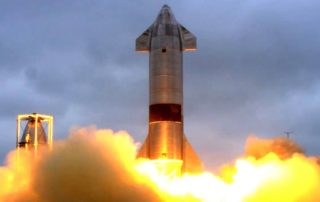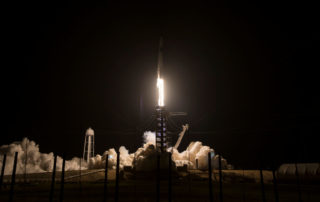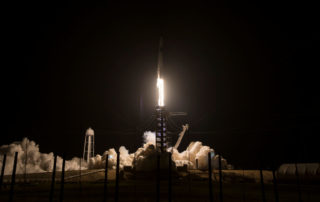Atmospheric Pollution from Rockets
Ioannis W. Kokkinakis and Dimitris Drikakis
University of Nicosia
Commercial space flights will continue to rise as reusable space vehicle technology will allow space transportation at a low cost. This is also evident by the recent flights of SpaceX, Virgin Galactic, and the New Shepard space ships. The paper shows that pollution from rockets should not be underestimated as frequent future rocket launches could have a significant cumulative effect on climate.
Objectives of the study
What Does This Mean?
- The impact of rockets exhaust gases on the atmosphere is a crucial factor requiring careful consideration in the design of future rocket launches
- The insight into the gas dispersion into the atmosphere is crucial for appreciating the scale of pollution
- Microphysical parameters, such as the emitted alumina particles distribution and the chlorine activation rate constant, need further investigation. This is considered essential because alumina-related global ozone loss could be tenfold more significant than presently assumed
- All the above could have longer-term implications for the earth’s climate.
Atmospheric pollution from rockets
Read the full paperNon-Technical Summary
Commercial space flights will continue to rise as reusable space vehicle technology will allow space transportation at a low cost. This is also evident by the recent flights of SpaceX, Virgin Galactic, and the New Shepard space ships.
The impact of rockets exhaust gases on the atmosphere is therefore a crucial factor requiring careful consideration in the design of future rocket launches. It is also crucial for appreciating the scale of pollution caused by these flights.
The paper addresses the impact of rockets exhaust gases on atmospheric pollution through high-resolution computational fluid dynamics simulations. Researchers have modeled the exhaust gases and developing plume at several altitudes along a typical trajectory of a standard present-day rocket, as a prototypical example of a two-stage rocket to transport people and payloads into Earth orbit and beyond.
In their paper, the researchers show that pollution from rockets should not be underestimated as frequent future rocket launches could have a significant cumulative effect on climate. The production of thermal nitrogen oxides (NOx) can remain considerable up to altitudes with an ambient atmospheric pressure below but of the same order of magnitude as the nozzles exit pressure. At the same time, the emitted mass of carbon dioxide (CO2) in the mesosphere is equivalent to that contained in 26 cubic kilometers of atmospheric air at the same altitude.
Contact Information
For more information about this study, please contact Prof Dimitris Drikakis at [email protected].
For more information about this study, please contact Dr Ioannis William Kokkinakis at [email protected].
Press Coverage
Articles and press mentions in global media about the research.
Scientists Discover That Rocket Exhaust Pollution Lingers in the Earth’s Atmosphere for a Disturbing Amount of Time
Scientists have discovered that rocket engine exhaust pollution can significantly increase the concentration of pollutants in the mesosphere for an extended period of time.
SpaceX Rocket Fumes “Hazardous to Humans” and the Climate, Scientists Warn
It looks like the exhaust fumes from SpaceX's Falcon 9 rockets (and others like it, including Blue Origin) are actually toxic to humans — and to the planet we call home.
SpaceX, Blue Origin Rocket Pollution May Harm Health, Climate: Study
The pollution from rockets built by SpaceX, Blue Origin, and Virgin Galactic could damage human health and hurt the Earth's climate, a new study shows.
Rocket engine exhaust pollution extends high into Earth’s atmosphere
Reusable space technology has led to a rise in space transportation at a lower cost, as popularized by commercial spaceflights of companies like SpaceX and Virgin Galactic. What is poorly understood, however, is rockets' propulsion emissions creating significant heating and compositional changes in the atmosphere.
Elon Musk’s SpaceX Falcon 9 Shows Harmful Effects on the Environment | Tech Times
Elon Musk’s SpaceX Falcon 9 Shows Harmful Effects on the Environment | Tech Times Are rocket launches harmful to the environment? A new study published on Tuesday, May 17, 2022, based on the Falcon 9 by Elon Musk's SpaceX suggests that space flights produce a significant amount of carbon dioxide in the upper atmosphere. It was modeled after Falcon 9's fumes and exhaust from a launch of up to 42 miles into the atmosphere. The Falcon 9 comes with [...]
Rocket Launches Could Be Polluting Our Atmosphere in New and Unexpected Ways – Gizmodo – TodayHeadline
The bright trail of a rocket launch against the sky
Elon Musk’s SpaceX Falcon 9 Shows Harmful Effects on the Environment | Tech Times
Researchers found that the CO2 emitted by the rocket wasn't that significant in the lower atmosphere compared to the surrounding air. This is due to the speed of the rocker and the denser concentration of gases in the lower atmosphere.
Rocket engine exhaust pollution extends high into Earth’s atmosphere
Reusable space technology has led to a rise in space transportation at a lower cost, as popularized by commercial spaceflights of companies like SpaceX and Virgin Galactic. What is poorly understood, however, is rockets' propulsion emissions creating significant heating and compositional changes in the atmosphere.










